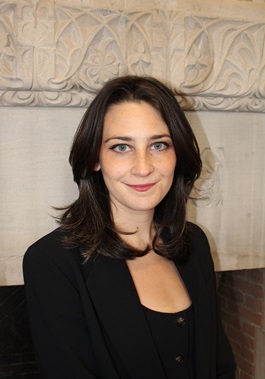Dr Eve Houghton, St John's
eh565@cam.ac.uk

Biographical Information
I am a Research Fellow in English at St John’s College, Cambridge. I completed my PhD in English from Yale in 2024. Before that, I received an MPhil from Cambridge and a BA from Yale. My research has been supported by the Folger Shakespeare Library, the Beinecke Rare Book and Manuscript Library, and the Bibliographical Society of America. I have taught courses on early modern English literature, Shakespeare, and the history of the novel.
Research Interests
My research focuses on early modern English literature. I have particular interests in narrative theory, theatre history, gender and sexuality studies, and book history.
My essays have appeared in Critical Inquiry, ELH: English Literary History, and The Papers of the Bibliographical Society of America. I am co-editing, with Dennis Duncan, a volume of essays on the history of the book index. I am also co-editing, with Colton Valentine, a special issue of the journal Narrative on free indirect style in languages other than English. The issue includes work on French, German, Spanish, Latin, Polish, Russian, Korean, and Chinese literature.
My first monograph, Free Indirect Style Before the Novel, is about emerging methods for representing speech and thought in sixteenth-century English fiction. Free indirect style is associated with the novel, but it has a history that pre-dates the novel as a genre. Lacking novelistic methods (e.g. quotation marks), writers like William Baldwin, George Gascoigne, John Lyly, Thomas Nashe, and Philip Sidney adapted conventions from existing forms such as the dialogue, the sonnet sequence, and the playbook to figure the transition from one voice to another. The result is a disorienting indeterminacy of narrative perspective. The book argues that this early form of free indirect style foregrounds, with particular urgency, narration’s entanglement with the ethical stakes of understanding and giving voice to other people’s experiences.
My second book project, Awkward Types: Character and Attention in Early Modern English Drama, tells the story of the rise of awkwardness as both a theatrical phenomenon and a new formation of early modern masculinity. From pratfalls and inelegant dancing to awkward silences and deliberately unfunny jokes, awkwardness was a showcase for the performance of sophisticated actorly skills, involving precise control over the body and over the social dynamics of the stage. Awkward Types reanimates the early modern comic actors who played these roles: familiar names like Richard Burbage and Robert Armin, but also less-discussed figures like John Sinklo, Joseph Haines, and Cave Underhill. The charisma of the awkward type, his ability to steal attention away from more prominent players, shows us that the assumed hierarchies of masculine preeminence on the early modern stage were not so assured.
Selected Publications
Journal Articles and Book Chapters
“He Said/She Said: Free Indirect Style Before the Novel.” Critical Inquiry 51.2 (Winter 2025): 247-267.
“Overmeasure: The Indexes of Francis Daniel Pastorius.” In The Book Index through History, eds. Dennis Duncan and Eve Houghton. Under review with Penn State University Press.
“Fops vs Tops: Character and Attention in The Country Wife.” ELH 90.3 (Fall 2023): 667-691.
“Private Owners, Public Books: Henrietta Bartlett’s Feminist Bibliography.” The Papers of the Bibliographical Society of America 116.4 (Winter 2022): 567-587.
Special Issues
“Free Indirect Style: An Archaeology.” Eds. Eve Houghton and Colton Valentine. Narrative. Forthcoming 2027.
Exhibition Catalogues
The First Folio: Shakespeare For All Time? Yale University Library, 2023.
Pastime with Good Company: Writing and Leisure in Early Modern England. In Subscribed: The Manuscript in Britain, 1500-1800. Beinecke Rare Book and Manuscript Library, 2020.
I have reviewed scholarly books for the TLS and the Review of English Studies.

